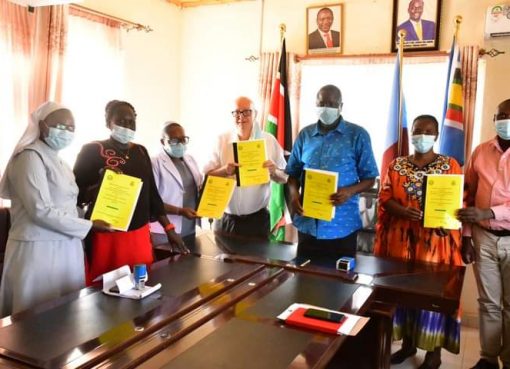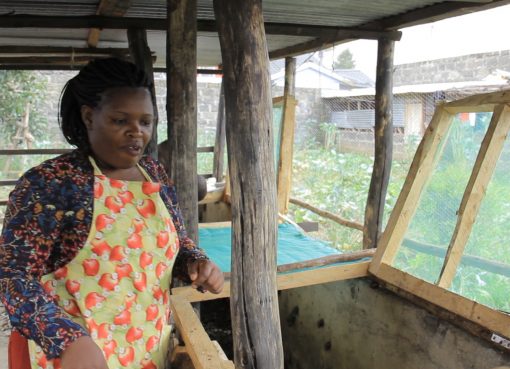A Non Governmental Organisation known as Echo network Africa has come out to engage women in Homa Bay County in a programme of aquaculture through cage fishing.
The programme targets to empower women and youth in the county to be financially independent by managing cage fishing in Lake Victoria.
The project is expected to be undertaken in Mfangano and Rusinga islands both in Suba North sub counties.
The organisation’s Chief Executive Officer Dr. Jennifer Riaria said the project will be done within a period of 18 months in the two selected areas before it is rolled out to other parts of the county.
“For now we are engaging different government agencies and other partners in identifying the gaps that are there
in fishing business. We want to find ways of incorporating women in fishing activities to empower them. The programme will start as soon as the research on Lake Environment is over,” she said.
Homa Bay County is one of the first areas identified in Kenya where the cage fishing activity will be carried out by the organisation.
The Lake has other cages fishing farms which are owned by private companies.
Dr. Riaria said her organisation intends to enable women in the county to own fish cages of their own.
Among the activities Echo Africa Network will do is to link women and financial institutions for monetary gain.
The officer said this on Thursday during a the project inception meeting held in Homa Bay Town, where she added that her organisation will enable women get loans from Saccos and Banks.
“Women have been known to be the supportive structure of families. We want to empower our women by adding their financial strength through aquaculture. This would be possible if they are supported with funds,” she said.
The women will also be linked to the market after they harvest their fish.
In addition, the fish farmers will get extension services to enable them adapt to emerging agricultural activities,
including pest and disease trends.
The CEO said the project will help in the reduction of spread of HIV and Aids in Homa Bay County.
At the same time, Riaria expressed concern over numerous cases of infection of the HIV virus especially along Lake Victoria Beaches.
This has been contributed by sexual engagement of fisherman and local women selling fish for material gain, commonly known as sex for fish.
Women have been reported to be offering sex to fishermen in exchange for fish supply.
Ms. Riaria said women along the Lake Victoria will be able to depend on their own for business.
During the meeting, several government agencies raised concern over various environmental impacts that would be promoted by increased number of cage fishing activities in Lake Victoria.
The Homa Bay County National Environment Management Authority (NEMA) Director, John Maniafu expressed concern over lake pollution contributed by fish feeds and materials used in making cages.
Maniafu argued that some fish feeds are not certified by the government.
“There has been concerns that some fish farmers make their own fish feeds locally and feeding them to fish in the lake. This is against the law because some feed many harm other water animals living around cages,” he said.
His sentiments were echoed by County Heath Executive Committee Member, Prof. Richard Muga and his environment counterpart, Dickson Nyawinda who said uncertified fish feed may be dangerous to human life.
The executives said digestion of fish that consumes feeds whose sources are unknown may cause bodily harm.
“Waste management should also be good and done in the right way. Those engaged in the programme must make sure that they do not interfere with other activities in the lake,” Prof. Muga said.
Meanwhile, National Government Affirmative Action Fund (NGAAF) in the area showed commitment of supporting the programme by empowering women through various means to enable them, earn a decent livelihood.
The County NGAAF Chairperson, Caroline Owidhi said the government had been able to build a cold storage facility at Homa Bay town fish market to enable women keep fish for long.
“Fish is perishable. As a way of improving its shelf life, NGAAF constructed a cold storage facility at Homa Bay Town fish market. We plan to construct others in other towns with fishing activities,” she said.
Officials from the Kenya Marine Research Institute (KEMFRI), a government body that studies fish life, said they will
conduct surveys on the lake to establish disease outbreaks on fish for the success of the programme.
Fishermen from Homa Bay expressed concern over numerous conflicts between cage fishing farms and fishermen.
The County Beach Management Units Networks Chairperson Edward Orem said fishermen have had conflict with local companies rearing fish in the lake.
“There are boundaries that fishermen should be at, when approaching fish farms. Absence of marks on the lake makes this difficult therefore making it difficult and thus promoting conflict. Fishermen have also decried declining fish stalks from such farms,” Oremo said.
He asked the government to provide security to fish cages to minimize theft and conflict.
Echo Network Africa said it will consider all the concerns before implementing the project.
By Anne Onyango/Davis Langat



